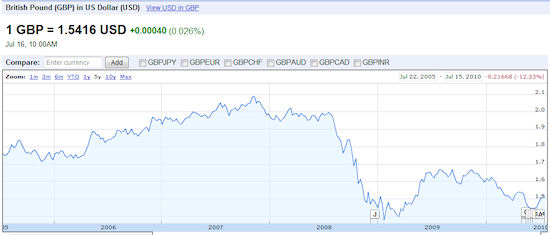Crisis-go-round
A joint meeting of the Federal Open Market Committee and the Board of Governors of the Federal Reserve System was held late last month and the minutes have recently been published. While they're all carefully worded, the apparent pessimistic shift on the part of these macroeconomic guardians has resulted in an instant weakening of the US dollar.
Prior to this meeting, the talk had mainly been about when to start tightening-up policy as the recovery gathers pace in order to keep inflation under control. But these minutes reveal considerable concern about deflation in the US and anticipate the possible need to provide yet further stimulus.
"In sum, the changes to the outlook were viewed as relatively modest and as not warranting policy accommodation beyond that already in place," said the minutes. "However, members noted that in addition to continuing to develop and test instruments to exit from the period of unusually accommodative monetary policy, the Committee would need to consider whether further policy stimulus might become appropriate if the outlook were to worsen appreciably."
Writing in The Telegraph, the excellent Ambrose Evans-Pritchard reported that the meeting concluded the US economy may not recover for another five or six years. Sentiment towards the US economy is changing amid a steady stream of negative macroeconomic news and the feeling is that at least Europe is openly confronting issues like Greece.
"The worm is turning," said David Bloom, currency chief at HSBC, in the Telegraph piece. "We're in a world of rotating sovereign crises. The market seems to become obsessed with one idea at a time, then violently swings towards another. People thought the euro would break-up. Now we're moving into a new phase because we're hearing alarm bells of a US double dip."
One consequence of all this has been a weakening of the dollar, with it going up by two cents against the pound yesterday. With the UK's deficit reduction strategy meeting with general approval, we might see a sustained strengthening of the pound against the dollar, although it's still got a way to go before it reaches the highs of last year, let alone 2007, as you can see from the Google Finance screen-shot below.














